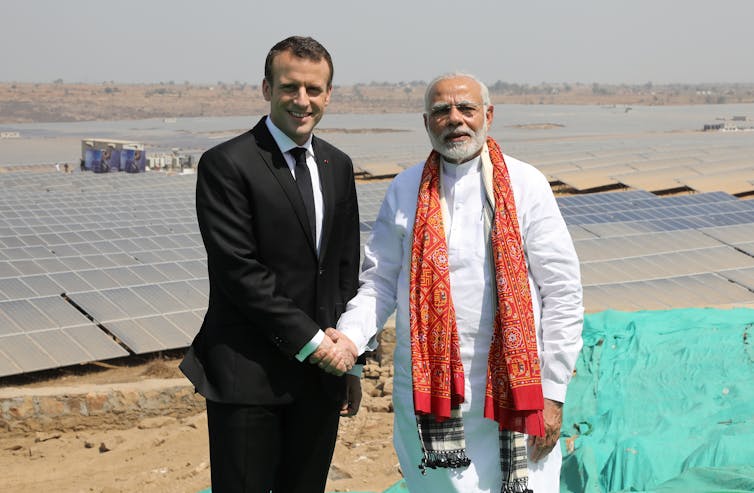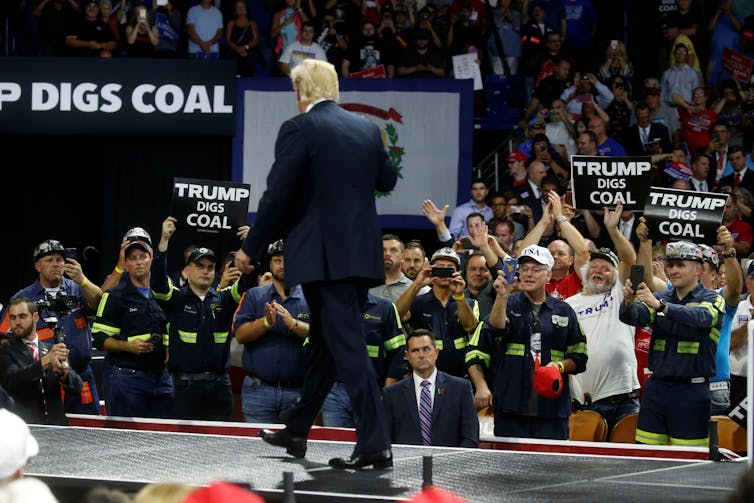Market-based policies work to fight climate change, from India to Jamaica
- Written by Jason Scorse, Associate Professor, Chair, Director, Middlebury
The economic foundation[1] at the heart of conservative political philosophy is that markets are the best way to allocate the bulk of society’s resources.
That faith in markets explains the Republican Party’s preference for, say, private medical insurance[2] over a government-run American health system. And it informs their push to loosen regulations that have governed big banks[3] since the 2009 financial crisis.
This emphasis on markets is also on display in many policies that conservative parties across the globe are enacting to address climate change. Climate change may be a partisan issue in the United States[4], but numerous surveys of other countries[5] reveal that tackling climate change is not incompatible with conservative principles[6].
Conservative governments with a strong climate record
Across Europe, Conservatives have gotten behind cap and trade[7], a market-based system for reducing carbon emissions.
The European Emission Trading[8] system, passed by the European Commission in 2005 with support across the ideological spectrum, sets limits on the continent’s annual carbon emissions. Companies that pollute more may purchase carbon rights from those who find innovative ways to reduce their own emissions, capping total pollution while giving individual firms the freedom to buy and sell their share.
The cap-and-trade strategy was first put into practice in the United States in 1990, under President George Bush, to combat acid rain[9].
In Germany, an industrial powerhouse, Chancellor Angela Merkel[10] of the center-right Christian Democratic party, has strongly supported[11] a comprehensive climate law that would combine cap and trade, tax incentives for renewable energy and major investments in energy efficiency.
To be fair, the political spectrum in Europe skews left. But conservatives in more right-leaning countries are fighting climate change, too.
India’s hard-right Prime Minister Narendra Modi – leader of the world’s largest democracy – is a strong proponent of renewable energy. While his administration maintains support for the coal industry, solar production is set to increase five-fold in India by 2022[12].
 Indian Prime Minister Narendra Modi with France’s Emanuel Macron at a new solar power plant in Mirzapur, India, March 12, 2018.
Reuters/Ludovic Marin/Pool[13]
Indian Prime Minister Narendra Modi with France’s Emanuel Macron at a new solar power plant in Mirzapur, India, March 12, 2018.
Reuters/Ludovic Marin/Pool[13]
And Chilean President Sebastian Piñera, who holds strong conservative views[14] on many social issues, has nonetheless embraced some of the most stringent climate goals[15] in Latin America.
According to the Climate Action Tracker, which monitors countries’ progress toward reducing carbon emissions, Chile will generate 65% of its electricity from renewable energy by 2035, and has imposed strict new energy efficiency standards on manufacturing, mining and transportation.
In Jamaica, the Labour Party – the island’s conservative party – has endorsed a new “climate accelerator[16].” Backed by billionaire Richard Branson and the Inter-American Development Bank[17], the initiative aims to make this vulnerable region more resilient by attracting financing[18] to scale up renewable energy, build low-carbon infrastructure and increase investments in green technology.
Climate change is a market failure
I am an environmental economist[19], but it doesn’t require advanced training in economics to recognize the basic principles underlying all these conservative-backed environmental policies.
The first is conservative faith that financial markets can adapt and innovate to address today’s climate challenge.
There’s evidence for this belief. Renewable power – which was economically unviable just a decade ago – is so affordable now[20] because governments and companies around the world have invested immensely in solar and wind[21]. What is expensive today can be made cheap tomorrow if governments put the right incentives in place.
The second basis for the climate policies conservatives worldwide support is an understanding that, under certain circumstances[22], markets can and do fail.
Markets function properly only under certain conditions.
First, the harmful impacts of producing a given good – which economists call “negative externalities[23]” – cannot hurt anyone other than the producers and consumers of that good. There must also be clear and enforceable property rights over every good in the marketplace.
When these bedrock principles are violated, market breakdown ensues.
Take air pollution, for example. When a chemical factory that produces a cleaning product releases toxic fumes, the cost of that pollution – the negative externality – is not borne exclusively by the buyer or seller of that product. Everyone who inhales the fumes suffers.
Yet because no one owns the “property rights” to the atmosphere, no one can hold the chemical factory or its clients legally responsible for contaminated air.
This is market failure. And in the environmental realm, it is the norm.
Every coal plant or natural gas field that emits the greenhouse gases that drives climate change[24] free of charge is violating the fundamental principle of well-functioning markets.
Policies like Europe’s cap and trade system or Britain’s carbon tax[25], which will soon require companies pay a fee[26] for every unit of pollution they emit, are designed to fix this problem.
 Donald Trump has made support for the U.S. coal industry a pillar of his administration.
Reuters/Leah Millis[27]
Donald Trump has made support for the U.S. coal industry a pillar of his administration.
Reuters/Leah Millis[27]
Global outliers
Not all conservatives embrace market-based environmental policies, of course.
Republicans in the U.S. voted overwhelmingly against a proposed carbon tax in 2016[28]. Then-House Majority Whip Steve Scalise said[29] it would be “detrimental to American families and businesses.”
Australia’s conservative party, which won a surprise victory[30] in May’s national election, is propelling the country backwards on climate[31]. A few years ago, they repealed a 2010 carbon tax[32]. Now the country’s new prime minister, Scott Morrison, is reducing the emission-reduction target Australia signed onto in the Paris climate accords and renewing his government’s commitment to the coal industry[33].
Brazil’s far-right President Jair Bolsonaro, too, has rolled back his country’s strict environmental regulations[34]. That’s left the Amazon rainforest open to deforestation[35] and fire[36].
The current governments of the United States, Australia and Brazil are global outliers who defy overwhelming basic economics and overwhelming scientific evidence[37] that climate change is one of the gravest risks facing humanity[38].
From Jamaica to India, rightist leaders have shown confidence that with the right incentives companies can and will innovate to transform the economy in a more sustainable direction.
[ Deep knowledge, daily. Sign up for The Conversation’s newsletter[39]. ]
References
- ^ economic foundation (www.press.uchicago.edu)
- ^ private medical insurance (www.economist.com)
- ^ loosen regulations that have governed big banks (www.forbes.com)
- ^ partisan issue in the United States (theconversation.com)
- ^ surveys of other countries (www.pewresearch.org)
- ^ not incompatible with conservative principles (www.ipsos.com)
- ^ cap and trade (theconversation.com)
- ^ European Emission Trading (ec.europa.eu)
- ^ to combat acid rain (www.smithsonianmag.com)
- ^ Chancellor Angela Merkel (www.cleanenergywire.org)
- ^ strongly supported (www.climatechangenews.com)
- ^ increase five-fold in India by 2022 (www.news18.com)
- ^ Reuters/Ludovic Marin/Pool (pictures.reuters.com)
- ^ strong conservative views (www.nytimes.com)
- ^ most stringent climate goals (climateactiontracker.org)
- ^ climate accelerator (theconversation.com)
- ^ Inter-American Development Bank (www.iadb.org)
- ^ attracting financing (www.worldbank.org)
- ^ environmental economist (www.middlebury.edu)
- ^ is so affordable now (www.forbes.com)
- ^ invested immensely in solar and wind (ourworldindata.org)
- ^ certain circumstances (scholarworks.umass.edu)
- ^ negative externalities (pressbooks.bccampus.ca)
- ^ greenhouse gases that drives climate change (www.nationalgeographic.com)
- ^ carbon tax (uk.reuters.com)
- ^ pay a fee (www.c2es.org)
- ^ Reuters/Leah Millis (pictures.reuters.com)
- ^ against a proposed carbon tax in 2016 (insideclimatenews.org)
- ^ said (www.atr.org)
- ^ surprise victory (theconversation.com)
- ^ propelling the country backwards on climate (www.forbes.com)
- ^ 2010 carbon tax (www.vox.com)
- ^ his government’s commitment to the coal industry (www.theguardian.com)
- ^ rolled back his country’s strict environmental regulations (theconversation.com)
- ^ deforestation (theconversation.com)
- ^ fire (theconversation.com)
- ^ overwhelming scientific evidence (climate.nasa.gov)
- ^ gravest risks facing humanity (www.nytimes.com)
- ^ Sign up for The Conversation’s newsletter (theconversation.com)
Authors: Jason Scorse, Associate Professor, Chair, Director, Middlebury

